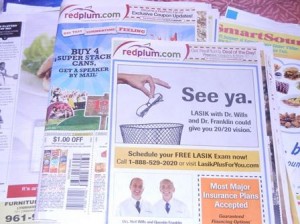
We’ve discussed Extreme Couponing too many times to count, and I’m not going to get back into it again. However, a lot of questions and concerns have arisen as a direct result of the show. I was informed of a fantastic interview with the executive director of the Coupon Information Corporation to help answer some of your questions and to shed some light on other topics. You can read the entire interview over at Klippin Krazy.
A few points from the interview:
FRUGALISTA: I can see how bad this would be if you are taking a high-value coupon for an expensive product, and applying it to a much cheaper product. But what if the product is around the same price, like a company’s regular toothpaste brand and then the new version with a new feature advertised on it? Do manufacturers really care in a case like that?
BUD MILLER: Yes they do care. Coupons generally have their own budgets. That goes into the whole accounting system … controlling expenses, managing the business.
The good news is that the new bar coding system should eliminate most of this. (Stores are) in the process of transitioning (now). (This is why on some coupons now you see two bar codes): you’ve got the older one and you’ve got the newer codes … They’re all in the process of moving towards it.
FRUGALISTA: Sometimes shoppers don’t even notice that the coupon is for a specific variety. It’s happened to me.
BUD MILLER: We’ve never had a situation where somebody just accidentally committed coupon fraud. Mistakes can happen, and that’s not considered fraud … but if somebody does it time and time again, and has knowledge and forethought and planning to commit fraud (that’s different.)
FRUGALISTA: What else should people watch out for?
BUD MILLER: Never pay money for a coupon. That will pretty much protect you from most of the counterfeits and issues like that.
If it seems too good to be true, it probably is. If somebody emails you a coupon for a free product and you can see it on the screen, there’s a 99 percent chance it’s counterfeit. Manufacturers do not distribute coupons in that manner. At this point I’m not aware of any (free) product coupons (distributed this way, not since 2002.)
FRUGALISTA: But aren’t most of these coupon clipping services just stay-at-home moms selling real coupons they clipped from Sunday papers?
BUD MILLER: I’m not aware of any legitimate coupon clipping service out there … Keep in mind that it inherently violates the terms and conditions of the coupons issued. In the event they say they get the coupons from the manufacturer, (you should contact the manufacturer.)
************************************************************************************************************************
Now, I know you are all wondering about the Clipping Services statement. Penny Pinchin Mom did all the legwork to find out if it is legal to buy coupons. The answer? No.
I have pulled one piece of the response and posted it below. Please head over and read the entire article!
Some coupon sellers have attempted to claim that the use of so called “legal disclaimers,” such as, “I’m selling an envelope, not the coupons themselves” provide them with legal protection as a sort of “Loophole” to allow such coupon sales. This is not the case; such disclaimers do not protect coupon sellers from potential civil liability.
While you probably won’t be prosecuted for buying coupons, I wanted everyone to be AWARE of the law and use your best judgement.
I found both posts to be enlightening, and I hope you all are able to take something away from them as well.
How do you feel about the interviews or will you continue to purchase coupons from clipping services?
Thanks to Klippin Krazy, Penny Pinchin Mom and Ann for this information
*CIC interview was copied with permission
Leave a Reply